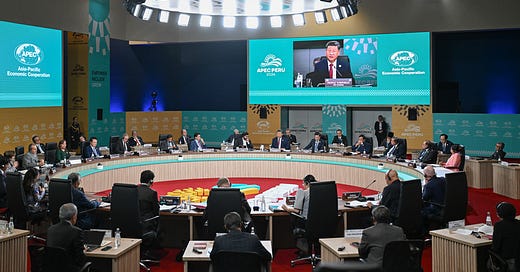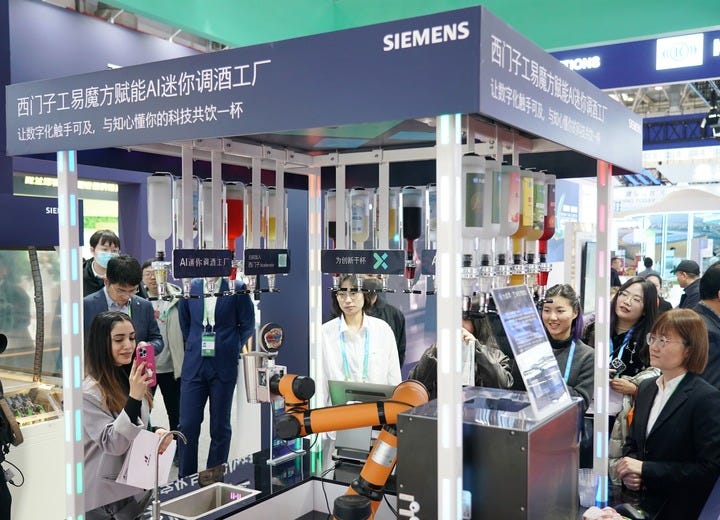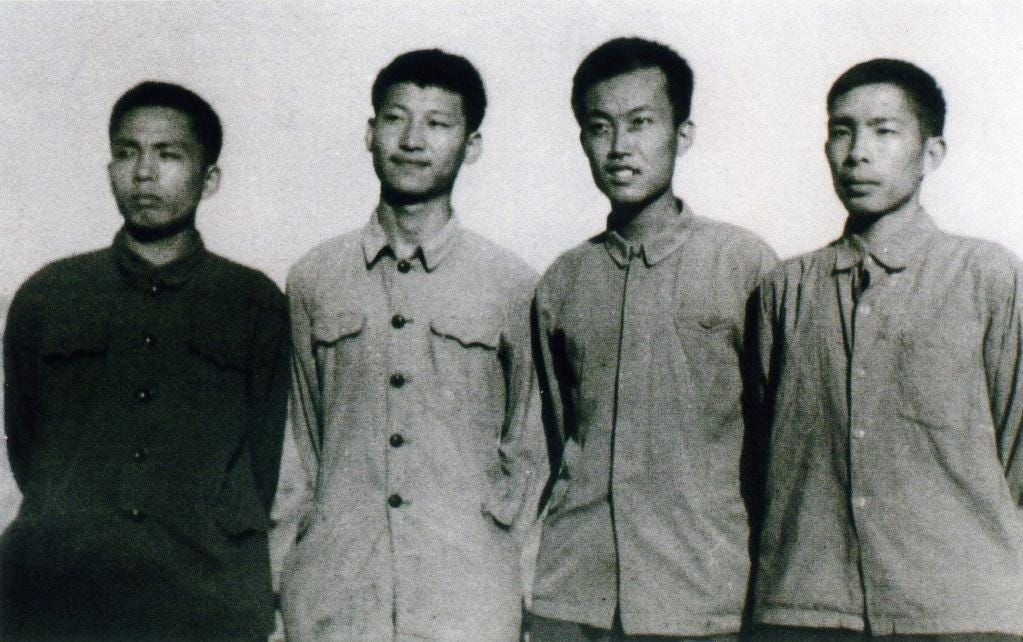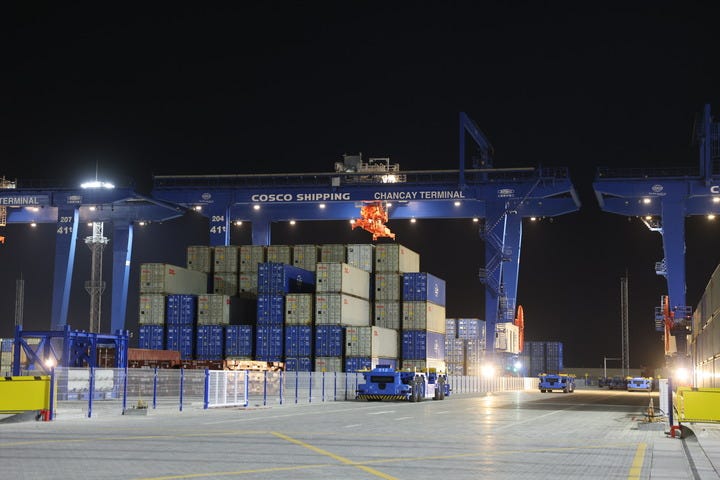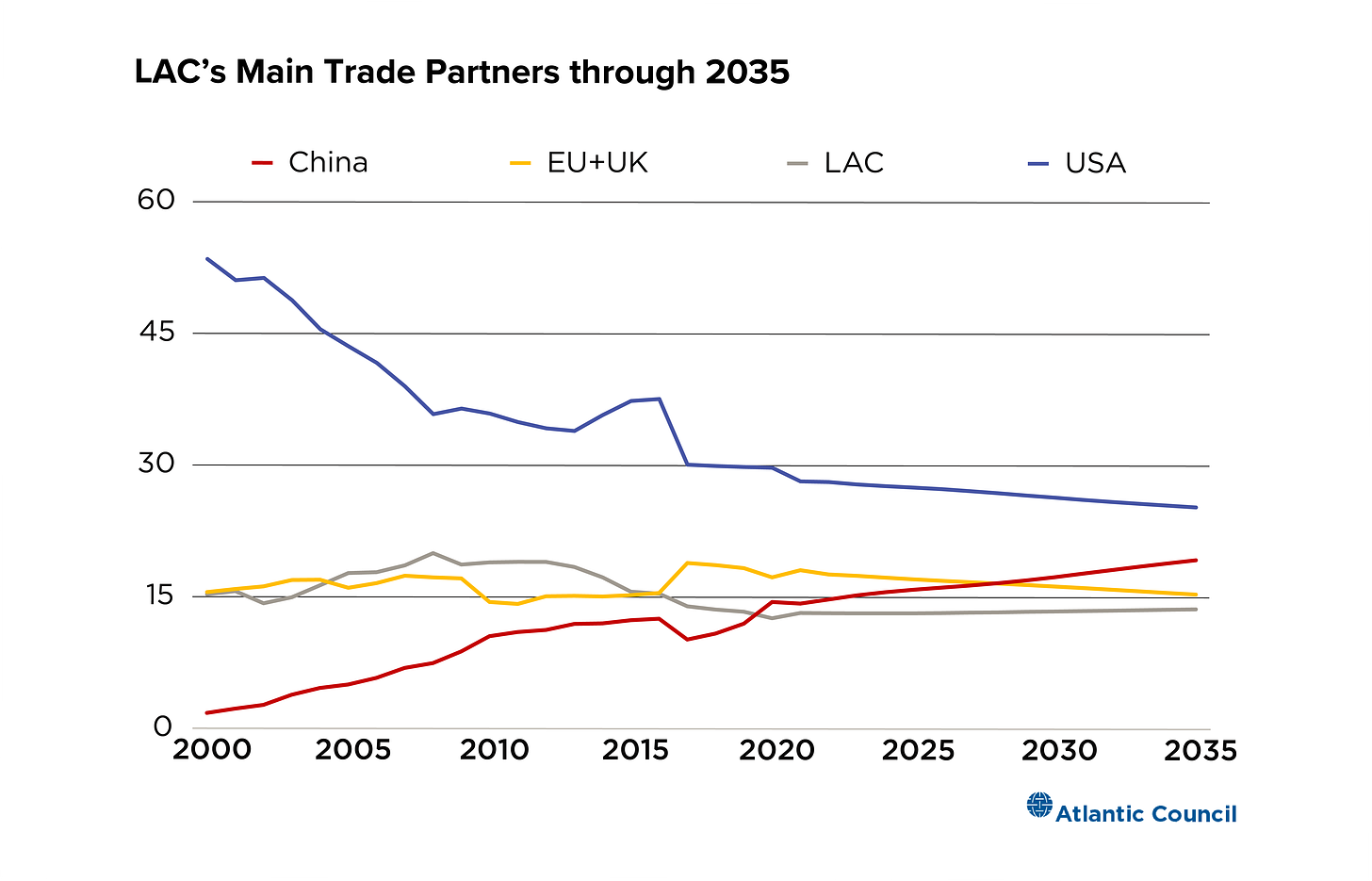Good evening. November this year was a significant month for Chinese diplomacy. Chinese President Xi Jinping visited Peru and Brazil, attended the APEC and G20 meetings back-to-back, and engaged in face-to-face talks with world leaders.
The speeches given by the Chinese leader on these occasions typically included content that can serve as a reference to China’s current major policy directions. Thus, although a week has passed, I still feel it's necessary to take the time to share some personal reflections on this visit. It must be said that the visit covered a wide array of topics, so this newsletter does not attempt to cover all potential highlights perceived by the outside world but rather focuses more on personal observations and thoughts.
Today's piece primarily revolves around four important speeches delivered by Xi at four APEC and G20 events. These speeches were made at the APEC CEO Summit, the 31st APEC Economic Leaders' Meeting, and the first and second sessions of the 19th G20 Summit.
Regarding the content of these speeches, I find the following parts particularly noteworthy.
Xi Jinping's written speech delivered at the APEC CEO Summit on Nov. 15
坚持与时俱进,推动全球经济治理体系改革。要坚持共商共建共享原则,推动全球经济治理体系更好反映世界经济格局新现实,不断提升“全球南方”的代表性和发言权,确保各国在国际经济合作中权利平等、机会平等、规则平等。要维护以世界贸易组织为核心的多边贸易体制,推动构建开放型世界经济体系,维护全球产业链供应链稳定通畅。
We should keep pace with the times and reform the system of global economic governance. We should follow the principles of "plan together, build together and benefit together" to ensure that the global economic governance system better reflects the new reality of the world economic map. The representation and voice of the Global South should be enhanced continuously, and all countries should be ensured of equal rights, equal opportunities and equal rules in conducting international economic cooperation. We should uphold the WTO-centered multilateral trading regime, push for an open world economic system, and keep the global industrial and supply chains stable and smooth.
What exactly does China mean by "reform the system of global economic governance"? Why is there a push for reform in this area? In fact, China's stance is not anything new. Yang Changyong, currently deputy director and researcher with 一带一路建设促进中心 the Belt and Road Promotion Center of the National Development and Reform Commission (NDRC), top economic planner, wrote an article titled “积极推动全球经济治理体系改革 Actively Promoting the Reform of the Global Economic Governance System” published on Economic Daily in April 2021 when he was serving 中国宏观经济研究院 the China Academy of Macroeconomic Research, a national-level think tank directly under the NDRC.
In the article, Yang pointed out two challenges faced by global economic governance to demonstrate why it is pivotal to promote the reform of the global economic governance system.
First, amid the collective rise of emerging markets and developing countries, global economic governance has yet to fully reflect the shifting dynamics of global power. Second, as global development becomes ever more imbalanced, the existing system of global economic governance falls short of effectively addressing the issue of unequal distribution of benefits.
In terms of the second challenge, Yang argued that the major institutions within the global economic governance system have long focused on efficiency and growth while not paying enough attention to the widening wealth divide, failing to find effective solutions.
Yang noted that reform would better reflect the interests and needs of emerging markets and developing countries, including China. This, in turn, would help enhance China's influence in global economic changes and create a more stable and balanced international environment for its high-quality development.
To promote the reform of global economic governance, he suggested several measures: promoting the Belt and Road Initiative (BRI), pushing for reforms of the World Trade Organization (WTO), International Monetary Fund (IMF), and World Bank, strengthening cooperation within the G20 and BRICS, and advancing the building of a Free Trade Area of the Asia-Pacific (FTAAP).
中国将全面深化改革,继续为全球经济注入强劲动能。中国将建设高水平社会主义市场经济体制,创造更加公平、更有活力的市场环境,推动实现资源配置效率最优化和效益最大化。中国聚焦财税体制改革、建设全国统一大市场、推进新型城镇化等重点领域攻坚突破,采取针对性措施提振消费、扩大内需,不断提升改革成效。中国出台了一系列重磅改革举措,将有力推动经济持续回升向好,有充足信心实现今年经济增长目标,继续发挥世界经济增长最大引擎作用。
China will deepen reform comprehensively and continue to provide robust momentum for the world economy. China will build a high-standard socialist market economy, foster a fairer and more dynamic market environment, and make resource allocation as efficient and productive as possible. China is endeavoring to achieve breakthroughs in key areas such as reforming the fiscal and tax systems, building a unified national market and advancing new urbanization. It is taking targeted steps to boost consumption and increase domestic demand so as to improve the effectiveness of reforms. China has adopted a full range of major reform measures, which will give a vigorous boost to the rebounding and growth of the economy. We have full confidence in meeting the growth targets for this year and remaining the biggest engine of world economic growth.
It is worth noting that in the original Chinese text, the sentence links "推进新型城镇化 advancing new urbanization" with "采取针对性措施提振消费、扩大内需 taking targeted steps to boost consumption and increase domestic demand." This arrangement is likely not coincidental. Both the Chinese government and experts have recently emphasized the correlation between urbanization and consumption.
At a press briefing on Nov. 19, the NDRC highlighted that there is still a lot of room for improvement in the country's overall urbanization rate. According to estimates, each one percent increase in urbanization could generate trillions of yuan in new investment and over 200 billion yuan in additional consumption.
Prof. Yao Yang, a leading Chinese economist, also mentioned in a talk in Beijing this October that he had done some math calculations: if rural residents who have already moved to cities but don't yet have an urban household registration were granted full urban status, their consumption could increase by 12 to 13 percent. In 2023, the per capita consumption expenditure of urban residents was 1.81 times that of rural residents.
(Early this year, Prof. Yao joined me for a podcast episode “China's economy in transition: Prof. Yao Yang discusses the road ahead and policy implications” and shared his evaluations and expectations for China's macro and micro economic prospects in 2024. )
The above-mentioned "针对性措施提振消费 targeted steps to boost consumption" are likely familiar to those who have been closely following China’s economic policies this year, which include measures such as "推动大规模设备更新和消费品以旧换新 promoting large-scale equipment renewals and consumer goods trade-ins."
At the November press conference, the NDRC also said that the government “would crack down on practices, based on laws, like ‘raising prices before offering discounts’ and ‘false discounts.’” These are tactics that some businesses might take advantage of in response to the trade-in policy, but they could seriously hurt consumer satisfaction.
This reminds me of the last section of the Party's resolution on further deepening reform comprehensively, which specifically stipulates that "the implementation of major reforms will be subject to oversight and inspection, and the litmus test of reform will lie in how well it performs, what it delivers, and how much satisfaction it brings our people.”
中国将建设更高水平开放型经济新体制,继续和世界分享中国发展机遇……中国积极推广144小时过境免签政策,进一步便利了中外人员往来,“中国旅行”爆火出圈。下一步,中国将出台更多自主开放和单边开放政策,扩大面向全球的高标准自由贸易区网络,让中国开放的大门越开越大。
China will build new, open and higher-standard economic systems and continue to share China's development opportunities with the world ... We have expanded the coverage of the 144-hour visa-free transit policy to facilitate inbound visits to China, and "Travel to China" is getting very popular around the world. Going forward, China will introduce more policies for voluntary and unilateral opening up, expand its globally oriented network of high-standard free trade areas, and open its door even wider to the world.
According to a report from the South China Morning Post, Prof. Zheng Yongnian, dean of the School of Public Policy at the Chinese University of Hong Kong’s Shenzhen campus, said on Saturday that the principle of “who is more open than whom” was key to gaining leverage in the U.S.-China rivalry when he was attending the Baichuan Forum hosted by the university’s Institute for International Affairs (IIA).
“Although competition between China and the U.S. is inevitable, we don’t have to be too afraid. But the core of the competition, we have to realize, is who is more open than whom,” he said.
“The ultimate winner will undoubtedly be [the side that is] more open,” he added. “I believe we will certainly outperform the U.S.”
On Nov. 22, Beijing announced that China will soon grant visa-free entry to citizens of Japan and eight other countries as part of its ongoing efforts to boost international tourism and business travel. The addition will expand the coverage of China's unilateral visa-free policy from 29 to 38 countries.
The ease of visa policies has shown remarkable results. According to China's National Immigration Administration, in the first three quarters of this year, China received approximately 94.63 million inbound trips, up by 78.8 percent year-on-year.
Address by Chinese President Xi Jinping at 31st APEC Economic Leaders' Meeting
一是构建开放融通的亚太合作格局。我们要坚持多边主义和开放型经济大方向,坚定维护以世界贸易组织为核心的多边贸易体制,充分激活亚太经合组织作为全球经贸规则“孵化器”的作用,着力推进区域经济一体化和互联互通,拆除割裂贸易、投资、技术、服务流通的高墙,维护产业链供应链稳定通畅,促进亚太和世界经济循环。
First, we need to build an open and interconnected paradigm for Asia-Pacific cooperation. We should stay committed to multilateralism and an open economy, firmly uphold the multilateral trading system with the World Trade Organization at its core, fully reactivate APEC's role as an incubator of global economic and trade rules, and advance regional economic integration and connectivity. We should tear down the walls impeding the flow of trade, investment, technology and services, uphold stable and smooth industrial and supply chains, and promote economic circulation in the region and the world.
The second China International Supply Chain Expo (CISCE), which runs from Tuesday to Saturday in Beijing, echoes what Xi said about "维护产业链供应链稳定通畅 uphold stable and smooth industrial and supply chains."
According to Xinhua, as the first of its kind in the world to focus on fostering supply chain cooperation, the expo, emerging at a time when "decoupling and breaking chains" are on the rise, aims to build up consensus, help companies integrate into global industrial chains, and promote win-win cooperation.
People view an AI-driven bartending system at the booth of Siemens in the Advanced Manufacturing Chain exhibition area of the second China International Supply Chain Expo in Beijing, capital of China, Nov. 27, 2024. (Xinhua)
坚持精准扶贫,做到因村、因户、因人施策。坚持在经济发展中扶贫,积极引导人才、资金、技术向贫困地区流动。坚持在促进当地特色产业发展中扶贫,帮助贫困地区改善基础设施,因地制宜发展有“造血”功能的产业。坚持在促进共同富裕中扶贫,推动发达地区同欠发达地区“结对子”互助。我先后在中国的村、县、市、省、中央工作,扶贫是工作的一个重要内容,也是我立志要办成的一件大事。
To tackle poverty, we make targeted policies tailored to each village, each household and each person; we facilitate growth by vigorously channeling talent, funds and technologies to underdeveloped regions; we help localities generate growth by fostering industries with distinctive features and upgrading infrastructure, all in light of their own conditions; and we promote common prosperity by pairing up well-off regions with less developed ones. I have worked from village to county, city, provincial and central levels. Poverty alleviation has always been a priority and a major task I am determined to deliver.
The following is Xi's resume of "working from village to county, city, provincial and central levels" in chronological order, according to reports from Xinhua. Such experience is indeed very valuable.
Feature: Xi Jinping as a village Party chief -- Xinhua
In 1969, 15-year-old Xi Jinping arrived in Liangjiahe under a campaign that saw tens of millions of urban educated youth live and work in the countryside.
This small village was where Xi took his first steps on a professional journey that would see him rise to president.
In 1974, Xi joined the Communist Party of China (CPC) and became the Party secretary of Liangjiahe.
Profile: Xi Jinping leads China on new journey -- Xinhua
In the late 1970s, after graduating from Tsinghua University, Xi served as a secretary to the minister of defense. In 1982, he volunteered to work at the grassroots level and moved to Zhengding, a poor county in north China's Hebei Province. Peng Liyuan, his wife, later said that many of Xi's classmates went abroad and he could have just done the same. But Xi stayed and chose a much harder path -- to be a servant to the people.
In his three years in Zhengding, where Xi served as deputy Party chief and then Party chief, Xi rode bicycles to all the communes and production teams of the county to inspect work. Sometimes, he arrived when villagers were tilling the fields. He would join them and do the farm work.
Then he spent over 17 years in Fujian Province and nearly five years in Zhejiang Province. He served multiple roles in the two coastal provinces including vice mayor, prefecture Party chief, municipal Party chief, provincial governor, and provincial Party chief. In 2007, he worked in Shanghai as its Party chief before ascending to the Standing Committee of the Political Bureau of the CPC Central Committee.
Xi Jinping (2nd L) poses for a photo in Yanchuan County of northwest China's Shaanxi Province in 1973. (Xinhua)
第一,携手高质量共建“一带一路”。在新设立7000亿元人民币融资窗口、丝路基金新增资金800亿元人民币基础上,进一步建设立体互联互通网络,以绿色丝绸之路引领,为数字丝绸之路赋能。
First, pursuing high-quality Belt and Road cooperation. On top of RMB 700 billion yuan added financing windows and an additional RMB 80 billion yuan injection into the Silk Road Fund, China is moving ahead with the development of the multidimensional Belt and Road connectivity network, one that is led by the building of a green Silk Road and will empower a digital Silk Road.
As a highly-anticipated flagship BRI project taken root in Latin America, the Chancay Port, which President Xi describes as “正在成为‘新时代的印加古道’新起点” becoming a starting point of an Inca Trail of the New Era,” is expected to enhance trade efficiency between Peru and Asia, cutting shipping time to China to 23 days and reducing logistics costs by at least 20 percent.
Situated approximately 80 kilometers north of the capital Lima on the Pacific coast and directly connected to the Pan-American Highway, a network of roads stretching across the Americas, the deepwater port is expected to become a pivotal logistics hub between Latin America and Asia.
This photo taken on Nov. 14, 2024 shows a view of Chancay Port in Peru. (Xinhua)
According to a report recently released by the United Nations Economic Commission for Latin America and the Caribbean (ECLAC), China is an important trade partner and the fastest-growing export market for Latin America and the Caribbean.
Image: LAC’s Main Trade Partners through 2035 (Percent Participation, Goods and Services), Scenario: Current Path
第五,完善全球生态治理,建设生态友好型世界经济 ...... 能源转型和能源安全是篇大文章,要坚持先立后破,使清洁能源平稳有序替代传统能源,加快世界经济绿色低碳转型。中方愿同各方持续深化绿色基建、绿色能源、绿色矿产、绿色交通等领域国际合作,在力所能及范围内为发展中国家提供支持。
Fifth, we need to improve global ecological governance and build a world economy characterized by eco-friendliness ... Energy transition and energy security is a major issue. We should follow the approach of "establishing the new before abolishing the old," and replace traditional energy with clean energy in a stable and well-ordered way, as we expedite the green and low-carbon transition of the world economy. China stands ready to continue to deepen international cooperation with all sides on green infrastructure, green energy, green mining and green transport, and will provide support to developing countries to the best of its ability.
The concept "先立后破 establishing the new before abolishing the old" could be often found in recent Chinese policy documents. For example, during China's annual Central Economic Work Conference last December, it was mentioned when discussing the guiding principles for China’s economic development in 2024.
According to Wen Bin, chief economist at China Minsheng Bank, previously, the concept was mainly used in the context of adjustments to the energy and industrial mix. During the annual Central Economic Work Conference last December, it was applied more broadly, with a focus on ensuring a smooth transition between old and new models. "The goal is to avoid rushing changes or applying one-size-fits-all solutions," Wen added.
Wen said that this concept could be applied to changes in not only the energy mix but also various areas, including economic momentum and real estate development models.
In international settings, when discussing energy transitions, China frequently uses the phrase "先立后破 establishing the new before abolishing the old." According to officials from the NDRC, this approach was derived from "learning from past experiences and conducting thorough research."
For example, Xie Zhenhua, who was then China's special envoy for climate change, delivered an important speech earlier in September last year at the 9th China and Globalization Forum in Beijing, organized by the Center for China and Globalization (CCG). He emphasized the need to prioritize energy transition in emission reduction actions and highlighted that respect for the national conditions of each country, under the principle of "先立后破 establishing the new before abolishing the old," is crucial to ensuring a just transition.
To me, the use of the term in international discussions also reflects China's efforts and confidence in sharing its development experiences with other developing countries. Enditem

